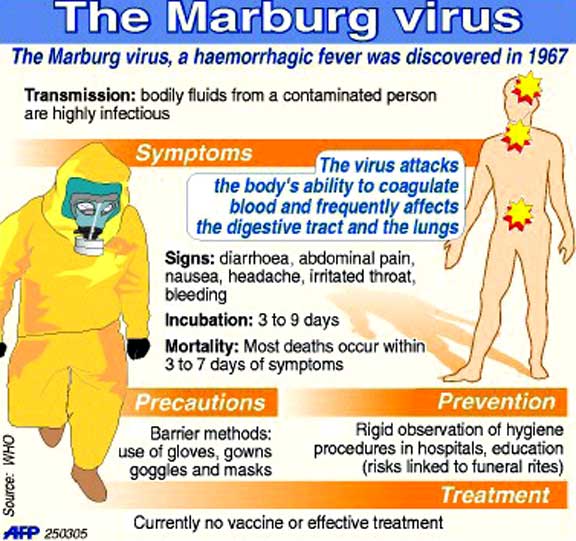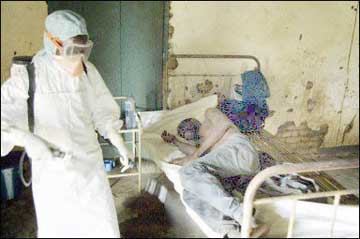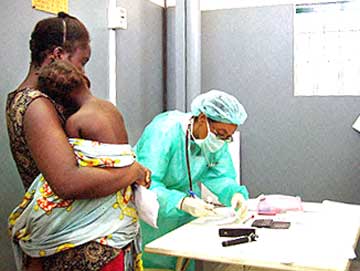| UN says Marburg outbreak in Angola worse than Ebola, launches aid
appeal |
|||
| April 8, 2005 | |||
LUANDA (AFP) - The outbreak of the deadly Marburg virus in Angola is worse than Ebola, a UN disease expert said, as the world body launched an urgent appeal for funds to fight the fever which has claimed 180 lives.
"Marburg is a very bad haemorrhagic fever, even worse than Ebola," said Allarangar Yokouib from the UN World Health Organisation (WHO). "We have had several Ebola epidemics in the region but none with such a high mortality rate," he told reporters at a press conference in Luanda. In Geneva, the WHO said the world's worst-ever outbreak of the virus was not yet under control. Mike Ryan, head of the WHO's emergency response unit, said international agencies and local health authorities must remain firmly engaged in Angola for the next four to six weeks, adding that the situation "now in Angola is not under control yet." The world body on Friday launched an emergency appeal for 3.5 million dollars (2.7 million euros) to "intensify the fight" against the outbreak which "was the largest ever recorded and still growing." "The appeal for 3.5 million dollars will enable UN agencies, including the WHO, UNICEF and the WFP to support the Angolan government intensifying outbreak control efforts," said the UN's resident co-ordinator in Angola, Pierre-Francois Pirlot. "It is clear that this epidemic is unprecedented not only in Angola, but everywhere. It is the biggest epidemic of haemorrhagic fever so far," he said. Most of the victims come from the northern town of Uige, the epicentre of the outbreak some 300 kilometres (180 miles) north of the seaboard capital Luanda. Some 200 cases had been reported since it first surfaced in October. "The victims included nine health workers, seven nurses and two doctors," said Angolan vice health minister Jose Van Dunem. Fear has gripped the capital and the country of 14 million people, which emerged three years ago from a brutal 27-year civil war. The Ebola-like Marburg virus, whose exact origin is unknown, spreads through contact with bodily fluids such as blood, excrement, vomit and saliva, but can be contained with relatively simple health precautions, according to experts. Yokouibd told reporters that the disease "was transmitted through contact with all bodily fluids which also included sweat and tears if you touch a sick person," but he stressed that it was "not an airborne disease". He said the worst-ever outbreak of Ebola, in the same family as Marburg, was in Uganda where some 404 cases were reported at the end of the outbreak. "We had several epidemics of Ebola in the region but none of which had such a high mortality rate," said Yakouibd. "It's worse than for example in Uganda." There was another Ebola outbreak in the Democratic Republic of Congo, with "only 144 cases" and another in Gabon, with 100 cases. The WHO has recommended that four neighbouring countries: Congo, the Democratic Republic of Congo, Namibia and Zambia go on a Marburg alert. The DRC has been on "rapid general alert" since March 30, while the Congo and Gabon have alerted its network of epidemiology watchers. Sao Tome and Principe, the tiny island country off the west coast of Africa, was screening all travellers from Angola, and Kenya has taken preventative measures. The death toll from the virus has jumped from 174 to 180 and has more than doubled in the last three weeks, now reaching into seven of the poor southern African country's 18 provinces. |
|||
 |

